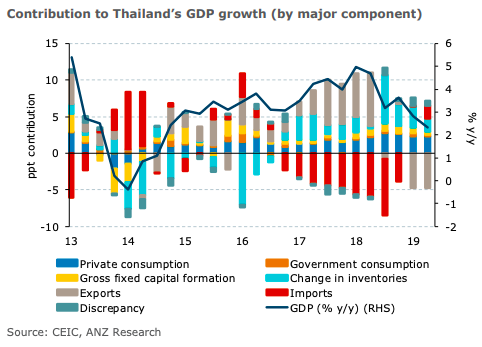Thailand’s gross domestic product (GDP) for the second quarter of this year recorded the weakest performance since Q3 2014, bringing H1 2019 growth to just 2.6 percent y/y, owing to slag in domestic demand.
The GDP breakdown showed a broad-based slowdown in domestic demand, with private consumption, government spending and investment all expanding at a slower pace. Stock-building also eased.
Meanwhile, the downturn in exports persisted, while the decline in imports deepened, resulting in a smaller drag from net export growth. By sector, agriculture and manufacturing contracted by 1.1 percent y/y and 0.2 percent y/y, respectively, in Q2, reflecting lower crop yields amid unfavourable weather conditions and weak external demand.
However, the recovery is likely to be modest. For a start, it remains unclear how quickly (and to what extent) the fiscal package, which is still pending cabinet approval, will filter through to the economy. It’s worth noting that the THB370 billion package includes THB270 billion in loans from state-run banks and the economic impact of which will be dependent on whether (and when) these are drawn out, the report added.
The combination of weaker-than-expected growth (BoT’s current growth projection is 3.3 percent), the relative strength of the baht, delays to the FY2020 budget and moderating core inflation raises pressure for the BoT to adopt a more accommodative stance.
"Looking ahead, there are reasons to believe that Q2 may have marked the worst for Thailand’s growth, but multiple headwinds suggest that any recovery is likely to be modest. Our full-year 2019 growth forecast is 2.9 percent, and we continue to pencil in a 25bp rate cut by the Bank of Thailand (BoT) by year-end," ANZ Research report added in its comments.



 Asian Stocks Slip as Tech Rout Deepens, Japan Steadies Ahead of Election
Asian Stocks Slip as Tech Rout Deepens, Japan Steadies Ahead of Election  Gold Prices Fall Amid Rate Jitters; Copper Steady as China Stimulus Eyed
Gold Prices Fall Amid Rate Jitters; Copper Steady as China Stimulus Eyed  South Korea Assures U.S. on Trade Deal Commitments Amid Tariff Concerns
South Korea Assures U.S. on Trade Deal Commitments Amid Tariff Concerns  Global Markets Slide as AI, Crypto, and Precious Metals Face Heightened Volatility
Global Markets Slide as AI, Crypto, and Precious Metals Face Heightened Volatility  Vietnam’s Trade Surplus With US Jumps as Exports Surge and China Imports Hit Record
Vietnam’s Trade Surplus With US Jumps as Exports Surge and China Imports Hit Record  Trump Endorses Japan’s Sanae Takaichi Ahead of Crucial Election Amid Market and China Tensions
Trump Endorses Japan’s Sanae Takaichi Ahead of Crucial Election Amid Market and China Tensions  Gold and Silver Prices Rebound After Volatile Week Triggered by Fed Nomination
Gold and Silver Prices Rebound After Volatile Week Triggered by Fed Nomination  Trump’s Inflation Claims Clash With Voters’ Cost-of-Living Reality
Trump’s Inflation Claims Clash With Voters’ Cost-of-Living Reality  Trump Signs Executive Order Threatening 25% Tariffs on Countries Trading With Iran
Trump Signs Executive Order Threatening 25% Tariffs on Countries Trading With Iran 































